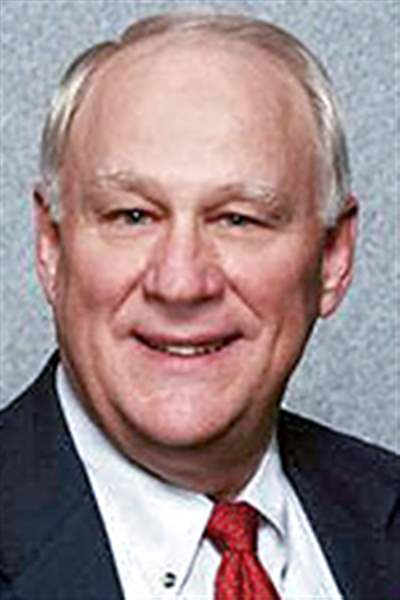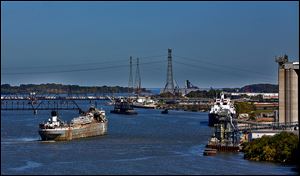
Plan for former Jeep site lauded
‘Spec’ warehouse could ‘jump-start’ area, consultant believes
10/11/2013
Feemster.

The freighter Manistee heads down the Maumee to Lake Erie after unloading salt at the Port of Toledo on Thursday. Tim Feemster said Toledo's designation as a Foreign Trade Zone should be promoted.
“Will build to suit” often fails to satisfy supply-chain businesses that need ready-to-use warehouse and distribution space, and the Toledo-Lucas County Port Authority’s plan for a 100,000-square-foot “spec” warehouse on part of the former Jeep factory site can meet that need, an industry consultant said at the agency’s Report to the Community breakfast Thursday.
“It’s a really smart idea to jump-start the community,” 35-year industry veteran Tim Feemster told an audience of more than 200 area leaders and business people at the Pinnacle banquet center in Maumee. Mr. Feemster is managing principal of Dallas-based Foremost Quality Logistics, a supply chain and economic development consultant.
The building size the port authority has chosen “is a good number for this market,” especially if the building can be expanded later, Mr. Feemster said during the keynote speech. Toledo is well-situated as a distribution hub for about a 200-mile range, he said, and that range will become increasingly attractive in the logistics industry as fuel prices rise.

Feemster.
Having completed a road and installed utilities from Central Avenue onto the 111-acre former Jeep site — renamed Overland Industrial Park — the port authority expects to break ground for the warehouse within a few weeks, said Matt Sapara, the agency’s vice president for development.
Airgas Inc., plans to build a 40,000-square-foot distribution center on 7.2 acres nearby at Overland, and Paul Toth, the port authority’s president, said agency staff is pursuing “other potential opportunities” at the site.
A second access road into Overland is planned as part of state plans to rebuild and widen nearby I-75 starting in 2015. The port authority bought the property from a Chrysler Corp. liquidation company three years ago and then spent about $2.8 million, mostly federal grants, to clean up debris and pollution.
Mr. Toth said Overland’s redevelopment and the “dry side” of the Ironville Dock project in East Toledo will rank high among port authority projects in the near future.
The port’s construction of a Maumee River ship terminal on Ironville Dock’s 76-acre “wet side” west of Front Street is nearly complete, with the final piece — construction of a warehouse — set to start later this month and be finished by year’s end.
Industry associated with shale-oil processing appears to be a strong prospect for the 110 acres of the former Gulf Oil refinery site that is east of Front Street, Mr. Toth said.
Rail sidings in the Ironville complex are now used for transferring oil shipped by train from the Bakken fields of North Dakota onto trucks for delivery to local refineries, Mr. Toth said.
Mr. Feemster said that in pursuing business-development prospects, local officials need to know and understand those prospects’ cost structures, supplier networks, and customer locations to identify which are most likely to fit in the Toledo area. That knowledge also helps officials tailor incentive offers to those prospects that are competitive but don’t go overboard.
“Do the analysis and set [incentives] at the right level,” he said, noting Toledo’s federal Foreign Trade Zone designation is “a huge opportunity for you folks” that is probably often overlooked.
Reduced operating costs are very lucrative to companies because the savings go straight to their bottom lines, Mr. Feemster said, whereas the value of increased sales is offset by the cost of producing more goods or providing more services.
He also told his audience that with union labor, “the issue’s not the pay, it’s not the benefits — it’s the work rules” that significantly increase costs.
A truck driver at a nonunion freight terminal can be also be assigned to a forklift to unload the truck after arrival, while a union driver “heads to the break room for four hours” until his outbound load is ready to go, the consultant said.
The Report to the Community marked the second year the port authority has given such a presentation.
Renewal of the agency’s 0.4-mill levy, used to pay for economic development programs, is on the Nov. 5 ballot in Lucas County.
But except for a brief mention of how that revenue is spent and an expression of hope for its renewal from port Chairman William Carroll, the levy campaign was not discussed during the 75-minute presentation, which included a 17½-minute video outlining port authority functions and activities.
Besides owning and overseeing several Maumee River port facilities, the agency owns and operates Toledo’s train station, operates Toledo’s two airports under a lease from the city, and sponsors an array of business-development financing programs.
In recent years it has coordinated and financed a program to retrofit Toledo buildings with energy-efficiency improvements and, last year, bought and renovated the city’s three municipal parking garages and took over responsibility for downtown metered parking — the latter while retaining the Downtown Toledo Parking Authority for daily management.
Contact David Patch at: dpatch@theblade.com or 419-724-6094.